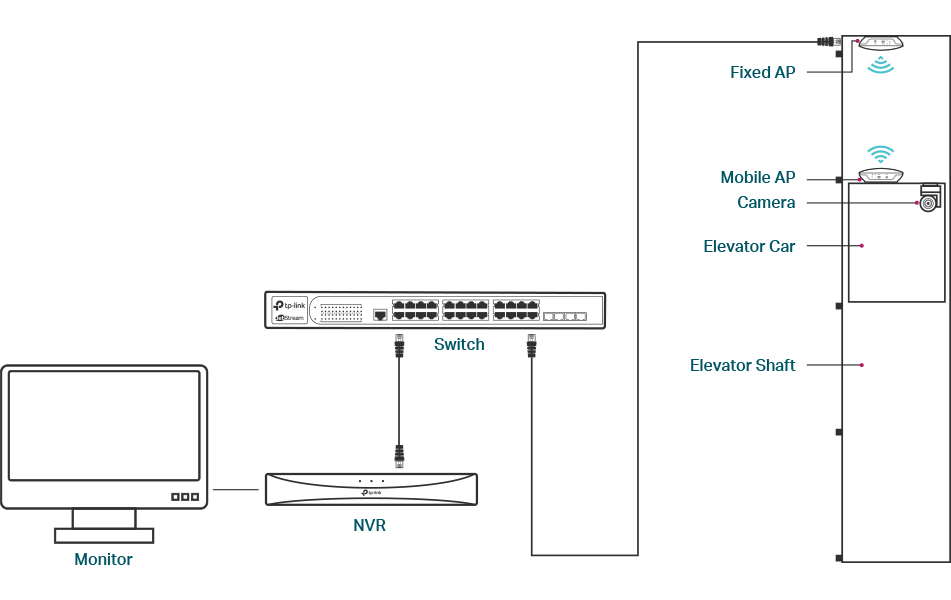For any business in a multi-storey building, ensuring elevators are connected to the network can be critical for applications like video surveillance and digital signage.
Traditionally, solutions like high tension Ethernet cables—running from either the top or bottom of the elevator shafts—are used to accomplish this. But there are some significant drawbacks to this method:
- Construction has to be completed in a way that allows for these cables.
- Installation is more intensive
- Eventually the cables will break due to normal wear and tear.
To mitigate these issues, TP-Link offers a solution: a wireless point to point link delivering throughput up to 300 Mbps.
Wireless coverage extends to the entire shaft to connect surveillance cameras or digital signage directly to your network. Record real time video to an NVR with virtually no hard wiring required—so there are no cables to wear out.
Wireless Installation is Easy Installation
Just like traditional options, deployment involves an end point at the top or bottom of the elevator shaft and another on the top or bottom of the elevator car. For the wireless networking for elevators, one CPE is recommended to be installed on the top of the elevator car as the mobile AP, connecting to the camera or digital signage, and it moves with the elevator car. While another CPE is installed on the top of the elevator shaft as the fixed AP, connecting to the NVR, or the main network.

TP-Link’s Pharos product series, consisting of professional CPEs and centralized management paltform, provides long-range wireless networking for applications such as wireless elevator networking. The products recommended to provide wireless coverage for the elevator are listed below. Please contact us for more installation information and pick up the right products according to your actual situation.
| Frequency | Fixed AP | Mobile AP | Max.WiFi Speeds | Ethernet Ports | Power Supply |
| 2.4 GHz | CPE210 | CPE210 | 300 Mbps | 1× 10/100 Mbps | 24V Passive PoE |
| 2.4 GHz | CPE220 | CPE220 | 300 Mbps | 2× 10/100 Mbps | 24V Passive PoE |
| 5 GHz | CPE510 | CPE510 | 300 Mbps | 1× 10/100 Mbps | 24V Passive PoE |
Why Choose TP-Link Pharos Products?
The Pharos product series from TP-Link provides long-range wireless networking for applications like WISP, Enterprise Bridge (P2P), Wireless Surveillance (PtMP), and wireless connections for elevators.
The product line consists of professional outdoor directional CPEs. Each Pharos device is compatible with the powerful PharOS web-based interface and the Pharos Control centralized management platform to make managing the network as simple and easy as possible.
Cost Saving Wireless Transmission with Easy Installation

Easy, Flexible Installation
Eliminate the limitations of traditional cable transmission distance and the construction requirements for cable deployment in an elevator shaft.

No Complex Cabling
Wireless transmission ensures cable wear and tear is a concern of the past. Physical deployment costs are reduced, due to fewer physical objects being required as well reducing construction costs.

Reliable Quality is Low Maintenance
The high product quality you get from TP-Link ensures maintaining your wireless elevator system is as easy as possible.

Passive PoE Support
Passive Power over Ethernet support allows for flexible deployment and convenient installation.
High-Speed and Stable Wireless Connections to Meet the Needs of Elevator Monitoring

WiFi Speeds Up to 300 Mbps
Max speeds of 300 Mbps ensure video monitoring and other data intensive functions are smooth and clear.

Stable Connections at High-Speeds
Real-world use has proven that Pharos products deliver stable transmission and smooth video even when elevators are rapidly running between floors.

Long-Range Video Transmission
TP-Link Pharos products easily relay HD video from elevator surveillance cameras thanks to extensive features that ensure robust long-range transmission.

Suitable for Buildings of All Different Types
Transmission power is linearly adjustable for adaption to a variety of transmission distances in different buildings—delivering reliable, high-performance WiFi in building of any shape and size.
FAQs
-
Do you have any cases about the applications of TP-Link wireless solution for elevator surveillance?
TP-Link wireless solution for elevators have been successfully applied to many buildings in various industries, such as Chengdu Radio and TV Tower and Sichuan Linshui Mingduyuan Court. For these two cases, stable wireless surveillance systems are built, and smooth video monitoring are running with stability.
-
How do I manage and monitor the network?
TP-Link Pharos products are compatible with the powerful PharOS web-based interface and the Pharos Control centralized management platform. Pharos Control is a free centralized management platform that allows you to manage and control every network device from any connected PC. Device discovery, mass configuration, scheduled operations, email notification and more features are provided.
-
Do you have whole solutions for my entire surveillance system?
Yes. Except for the wireless solution mentioned above, TP-Link also provides VIGI surveillance cameras and NVR, along with JetStream switches.
-
Do you have solutions for my entire hotel/school/accommodation… infrastructure?
Yes. In order to meet the demands for stable connections, quick deployment, centralized management, ease of use, and reasonable costs, TP-Link offers all kinds of business products for any situation, including indoor and outdoor access points, controllers, wireless broadband, switches, routers, surveillance cameras and NVR. Find more about TP-Link’s networking solution in your industry.
Disclaimers
*Maximum wireless signal rates are the physical rates derived from IEEE Standard 802.11 specifications. Actual wireless data throughput and wireless coverage are not guaranteed and will vary as a result of 1) environmental factors, including building materials, physical objects, and obstacles, 2) network conditions, including local interference, volume and density of traffic, product location, network complexity, and network overhead, and 3) client limitations, including rated performance, location, connection, quality, and client condition.








